10 Jul 18 | Event Reports, News and features
[vc_row][vc_column][vc_column_text]Additional reporting by Shreya Parjan and Sandra Oseifri.
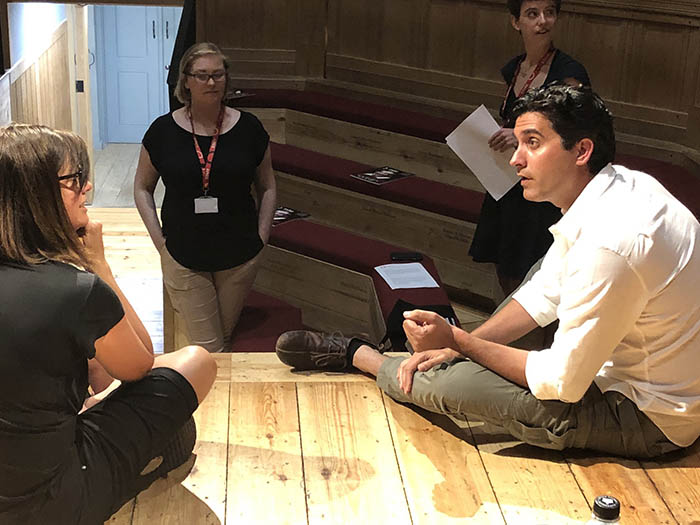
“When you hold the mirror up to […] a totalitarian regime, it recognises it and attempts to stamp it out,” said Tony Howard, a Warwick University professor, discussing how Shakespeare can be used to slip controversial ideas into public spaces under the eyes of the censors.
Howard was part of a discussion held at London’s Globe theatre looking at how censorship is used against theatres and how playwrights can sometimes get around it.
The Shakespeare Under The Radar debate was held as part of a series marking the 50th anniversary of the end of the UK Theatres’ Act in 1968. Until then the Lord Chamberlain had the power to stop plays going on stage, or mark sections of the script to be taken out.
The panel also featured Index on Censorship magazine editor Rachael Jolley, Memet Ali Alabora, the exiled Turkish actor, and Zoe Lafferty, theatre director and producer. It was chaired by Samira Ahmed, the award-winning journalist and broadcaster.
“Turkey is one of the rarest countries where the persecution of artists has never ended,” Alabora told the audience in the Sam Wanamaker theatre, named after an actor who was blacklisted in the USA during McCarthyism. “When you’ve got a state of emergency the law gives you the right to ban material because it is unsafe,” added Alabora.
Alabora talked about his personal experience as director and actor in the 2012 play Mi Minör. The play was set in Pinima, a fictional country where the president decides anything. Amid the wave of demonstrations and civil unrest during the 2013 Gezi Park protests in Turkey, the play was condemned by governmental and pro-governmental agencies, as an attempt to “rehearse” the protests. The threats against Alabora and his creative team forced them to leave the country because of fears for their safety.
Jolley said theatre can be a medium for social change, even in the face of censorship. “Theatre can do things in a way that is more radical or challenging because censors are more attuned to film and TV,” she said. She talked about how memes are used in China to get around censorship: “Everybody can use that form of communication to talk about things that are not allowed.”
Lafferty’s work, which includes Queens of Syria, the story of female Syrian refugees, focuses on conflict areas such as Afghanistan, Yemen, Palestine, Lebanon and Haiti. Her plays are dedicated to giving life to stories that might otherwise be inaccessible due to conflict, military occupation or censorship. “In the nine or ten years I’ve been involved with Palestine, the censorship, in lots of different ways, has been very brutal, including imprisonment and death,” she says.
However, it could be difficult to pinpoint exactly who does the censoring, she said. “It’s hard to get into all of the layers. There is the military occupation, the Palestinian authorities, the taboos of society, etc.” As Lafferty’s experience illustrates, there are also more insidious ways to silence: “There is a huge visa process which is a massive form of censorship.”
Despite the obstacles put in their way, Alabora and Lafferty have no intention of backing down from their theatrical work. Alabora directed Meltem Arikan’s play Enough is Enough, which highlights issues around incest, child abuse and violence against women. Meanwhile, Lafferty directed the play And Here I Am, which is based on the life story of Ahmed Tobasi, who went from being a member of Palestine’s Islamic Jihad to an actor.[/vc_column_text][/vc_column][/vc_row][vc_row][vc_column][vc_basic_grid post_type=”post” max_items=”4″ element_width=”6″ grid_id=”vc_gid:1531488724804-26d39abd-64f9-5″ taxonomies=”8146, 8175″][/vc_column][/vc_row]
10 Jul 18 | Index in the Press
Rachael Jolley, editor of Index on Censorship magazine, Jemimah Steinfeld, deputy editor, and Irene Caselli, freelance journalist and contributor, were live on air at Resonance FM on 10 July to discuss the latest issue which takes a special look at the free speech issues that affect the world’s most popular tourist destinations. We examine the journalists who are trying to expose the darker sides of paradise and the issues they encounter in doing so, including an article from a Maltese journalist, Caroline Muscat, on corruption in the country, a look at journalists living under protection due to their reporting of the drug wars in Baja California Sur and an interview with Federica Angeli, a journalist who lives under 24-hour police protection following her exposé of the mafia in the pretty Italian seaside resort of Ostia.
09 Jul 18 | Campaigns -- Featured, Media Freedom, media freedom featured, Statements
[vc_row][vc_column][vc_column_text]
Index on Censorship welcomes the decision on 6 July to acquit Angolan journalist and winner of the 2015 Index on Censorship Freedom of Expression Award for Journalism, Rafael Marques de Morais, along with editor Mariano Brás Lourenço, of defamation and slander for an article critical of Joao Maria de Sousa, Angola’s former attorney general.
If found guilty, the pair would have faced up to four years in prison; Marques de Morais for writing the article and Brás Lourenço for publishing it in the newspaper O Crime. The article in question investigated a real estate deal involving Maria de Sousa, who went on to sue on the grounds that he had been insulted. The judge in the case, Josina Ferreira Falcão, however, ruled that the article fulfilled the journalistic duty to inform the public and expose alleged wrongdoing while acknowledging that the real estate transaction was “tainted with irregularities”.
“That a judge sided with media freedom and independent journalism is a welcome step forward for Angola, a country where most of the media is still under the control of the government and critical journalists are too easily prosecuted for defamation,” Jodie Ginsberg, CEO of Index on Censorship, said. “However, no media worker should ever be made to stand trial in the first place simply for pursuing the truth and we demand that steps now be taken in Angola to ensure greater legal protection for journalists.”
[/vc_column_text][/vc_column][/vc_row][vc_row][vc_column][vc_basic_grid post_type=”post” max_items=”4″ element_width=”6″ grid_id=”vc_gid:1531147844271-8e182548-c414-0″ taxonomies=”6964″][/vc_column][/vc_row]
09 Jul 18 | Egypt, Middle East and North Africa, News and features
[vc_row][vc_column][vc_column_text]
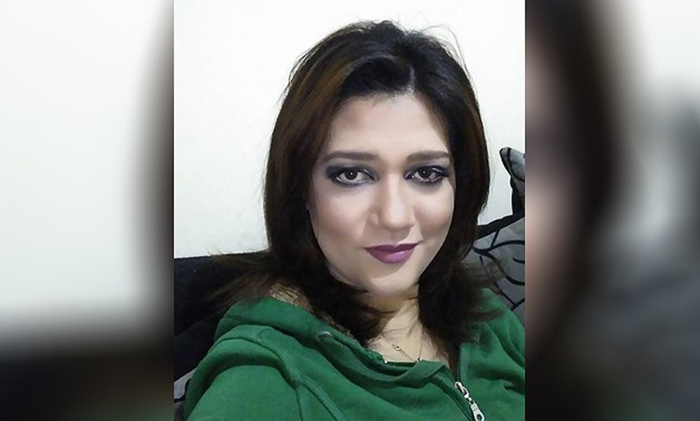
Activist Amal Fathy has been ordered detained. (Photo: Facebook)
Egyptian activist Amal Fathy, who was arrested on 11 May after posting a video criticising sexual harassment in Egypt – of which she herself is a victim – to Facebook, will next appear in court on 15 July 2018 after her pre-trial detention of 15 days was extended for the fifth time.
Fathy, who is detained at Al Qanater prison north of Cairo, stands accused of “belonging to a banned group”, “using a website to promote ideas calling for terrorist acts” and “intentionally disseminating false news that could harm public security and interest”.
When Fathy arrived at the Prosecution Office on 4 July, she showed symptoms of acute stress and was unable to walk on her own having lost sensation in her left leg. She was unable to walk normally unassisted. Fathy has a history of chronic depression, bipolar disorder and anxiety, conditions that have only worsened during her detention.
Fathy, along with her husband, Mohamed Lotfy, director of the Index award-winning NGO Egyptian Commission for Rights and Freedoms, and their son, were taken into custody during an early morning raid on their home soon after she posted the 12-minute video on 9 May about her experience with sexual harassment and the difficulties of being a woman in Egypt. As an activist, Fathy has also been vocal about human rights violations in Egypt, especially the arbitrary detention of other activists. Lotfy and their son – who Fathy was the primary carer of before her arrest – were later released.
“We stand in solidarity with the members of ECRF, call for the immediate release of Amal and demand that all charges against her be dropped,” Perla Hinojosa, fellowships and advocacy officer at Index on Censorship, said. “Index invites our readers to join two existing campaigns for her release, one by Amnesty International addressing the Egyptian president and minister of foreign affairs, and the other by Amal’s husband Mohamed calling for action from the European Parliament.” [/vc_column_text][/vc_column][/vc_row][vc_row][vc_column][vc_basic_grid post_type=”post” max_items=”4″ element_width=”6″ grid_id=”vc_gid:1531134800432-bdb56a3c-c68b-6″ taxonomies=”147″][/vc_column][/vc_row]
09 Jul 18 | Index in the Press
As part of a discussion of the V&A’s new exhibition marking 50 years since the ending of theatre censorship, the Independent cites Index on Censorship work to support the play Homegrown, which was cancelled by the National Youth Theatre. Read the full article.
06 Jul 18 | Academic Freedom, News and features, Turkey, Turkey Uncensored
[vc_row][vc_column][vc_column_text]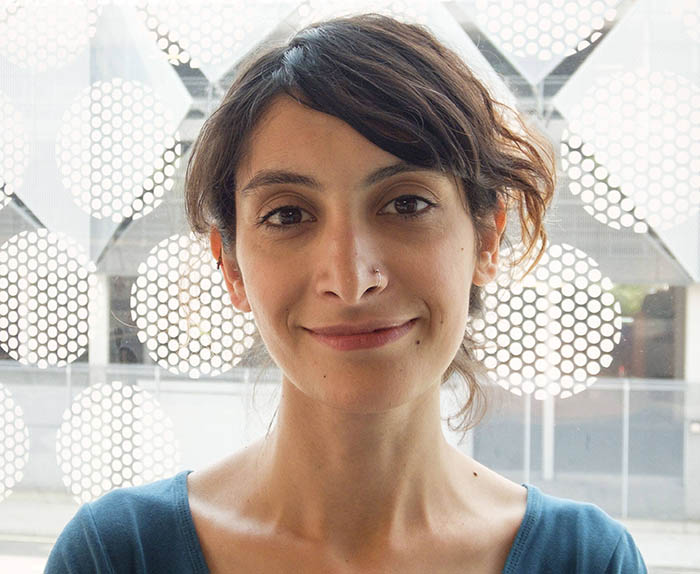
Sahika Erkonan never thought signing a petition meant signing away her life, her family or her country. Marooned in London, she now faces an uncertain future.
Erkonan was one of over 2,000 Turks that signed a January 2016 petition by Academics for Peace, an organisation formed in 2012 that advocates for peace between Kurds and Turks. The signatories called on the Turkish government to end its war with Turkey’s Kurdish population in the southeast of the country.
Erkonan was a research assistant studying for her PhD at the University of Ankara when she joined other students and university professors in criticising the Turkish government’s ongoing conflict with the Kurds.
With signatures from over 90 universities, the petition had wide-reaching implications. Deemed “so-called intellectuals” by president Recep Tayyip Erdogan, 330 academics were dismissed from their universities on 7 February 2017 for alleged involvement in the July 2016 coup. Hundreds of academics were held on criminal charges as the government cracked down on “organisations or groups that are determined to carry out activities against [the] state’s national security”.
Immediately after signing the petition, Erkonan was placed under investigation by the University of Ankara. As part of her research assistant contract, she was due to work at another university in the country. However, after being put under investigation, Erkonan decided it was best to continue her thesis abroad, resigning from the University of Ankara. The university accepted her resignation and she was able to use her passport to leave the country, unlike many others, although four months later she was dismissed by decree.
Now studying and living in the UK, Erkonan spoke with Danyaal Yasin of Index on Censorship about her experience.
Index: After you and hundreds of other academics and students were exiled, what were your initial thoughts?
Sahika Erkonan: I was in denial. I was upset. People told me I was an exile when I arrived in London. I denied it. I just wanted to focus on my research without thinking about the question of returning to my country. After my dismissal, which was four months later, this uncertainty became certain and weighed down on me far more than before. My first thought was that I had expected to be dismissed from the university. I wasn’t the first [to be dismissed]. It was clear that the government does not want intellectuals to raise their voices because we want peace, and this disturbs them, and this leads to our removal from the universities.
Index: Where were you when you found out you were dismissed? How did this affect you and your family?
Erkonan: I was at home in London. One of my friends let me know about our dismissal. Since that day, I haven’t gone back to Turkey. It has hugely affected my life. I realised that I cannot travel. If I decided to go home, I wouldn’t be able to come back to London to continue my research. I wouldn’t have any chance of finding a job in Turkey and I would be at risk all the time.
My family became very sad, but they were very supportive and my mother gave me lots of encouragement to finish my PhD here because any decision to return means uncertainty about leaving Turkey again due to passport issues. Actually, now I am not able to travel out of the United Kingdom either and have no clear residency status without applying for asylum. I am stuck here and this affects everything; my wellbeing, my ability to carry out my research, my political activity, my entire life. However, I am much better than last year and I feel I could define the difficulties I had and I can continue.
Before coming to London, I assumed I would go back to Turkey for a holiday within two months. Now I am still waiting to get my travel rights back, and have no idea when, if ever, they will be returned. I was lost for words following my dismissal. It wasn’t that I lost my job, I also lost my rights. Although I wasn’t the first to be dismissed, the feeling of loss still felt unknown.
Index: How did it impact your studies?
Erkonan: It fundamentally affected my research. The predominant focus I have in my life: work is being paralysed. I have a sense of not being in control and not being able to think clearly or critically. It takes incredible resilience and I often doubt myself. I was not able to work productively. I am so lucky that I am supervised by two amazing people in London. They are very supportive and understanding. They are not only dealing with my thesis, but they are also friendly and help me emotionally.
Immediately after I came here, my supervisors were aware of the risks and they wanted me to change my thesis fieldwork, as my initial research was based on Turkey. After four months, I was dismissed by Ankara University and unfortunately my everyday life was massively affected therefore I couldn’t concentrate easily. But now, I am in a totally different mindset.
Index: What was the most difficult part?
Erkonan: For me, the most difficult part is defining and understanding the feeling and emotions I’ve encountered. The uncertainty has a material, political basis that reflects the precariousness of the refugee’s sıtuation in Britain, a country with its own issues regarding the rights of foreigners. I have been interested to see how UK academia enforces conformity, not by jail sentences, but by neoliberalisation. Under the state of emergency, the law decrees against dissidents mean civil death. Your passport is taken away so you can’t travel abroad and you can’t find employment in public and private services. Trying to fight back is hard because you have no rights; you have to wait for the state of the emergency commission to make specific decisions about the law decrees.
During this process, I’ve never felt alone. Since the government’s attacks started, Turkey’s academics have stood in solidarity.
Index: Why do you think that people in academia are being brought to trial? What’s the government’s goal?
Erkonan: To silence dissent and crack down on critical thought. Academics for Peace is not the first instance of this; the government has always been in conflict with intellectuals, with students. It’s become especially clear that the AKP [Turkish ruling party] are trying to divide us academics by bringing us to trial individually. The authorities cannot judge over 2000 people without it being a huge international scandal; they are doing it individually to fly under the under the radar of international law but to keep us all in a continual state of fear and exhaustion. Every dissenter is at risk, we academics are only one part of that.
Index: What has been the biggest change for those in education within the country since the attempted coup?
Erkonan: Immediately after the attempted coup, the AKP government declared a state of emergency. Pressure on the education system by power had already been strong but thanks to the state of emergency, the authorities have had a chance to apply arbitrary policies. Therefore, they have applied whatever they want easily and they started to change the university staff.
Index: What do you think of the current educational system in Turkey? Has it declined/improved?
Erkonan: Universities in Turkey are not independent. They have been controlled by the Higher Education Council since the military coup in 1980. In the aftermath of the coup attempt of 2016, 5822 academics have lost their job. The state of emergency has given much more power to the authorities and we can say the educational system has declined rapidly.
Index: Do you feel the current climate will ever improve within the country?
Erkonan: Unfortunately this is a process which all of us have to witness in this climate. We are still having days which we are still trying to comprehend what’s happening. It seems the situation won’t improve within the country, but this is what the authorities want. Decreasing the hope for the future, increasing the fear of power.
If you look at Turkey’s past, you can guess and analyse how the current situation will play out. In terms of oppressing dissenters in the country, authoritarian states all have similar aspects, but whenever it occurs, we see it as new so it brings shock and fear, and sometimes it makes us silent. We live in an era, internationally, of the rise of authoritarianism. This places all those who do not fit into a narrow obedient vision of ‘the people’ at risk. Intellectual enquiry places us outside conformist ways of thinking so we will always be at risk. This era will take an international effort to maintain the existence of oppositional ideas, which are under attack globally. But I am not hopeless. One day this climate will change. [/vc_column_text][/vc_column][/vc_row][vc_row][vc_column][vc_basic_grid post_type=”post” max_items=”4″ element_width=”6″ grid_id=”vc_gid:1531843923773-49fd17dd-fbe5-6″ taxonomies=”8607″][/vc_column][/vc_row]
05 Jul 18 | News and features, Volume 47.02 Summer 2018, Volume 47.02 Summer 2018 Extras
[vc_row][vc_column][vc_column_text]
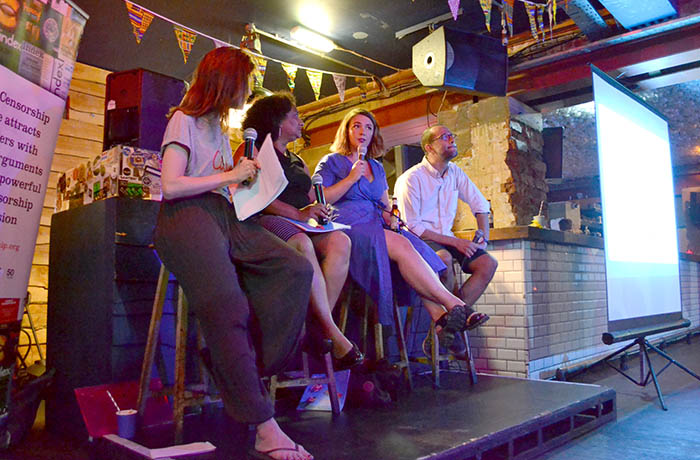
Vicky Baker, Meera Selva, Harriet Fitch Little and Benji Lanyado. Credit: Rosie Gilbey
“I would always err towards saying go rather than don’t go,” said Benji Lanyado, travel writer and founder of picture agency Picfair, speaking at a panel debate to launch the summer 2018 issue of Index on Censorship magazine.
The latest issue of the magazine, Trouble in Paradise, looks at the free speech issues that are prominent in certain top travel destinations, and yet are often overlooked by tourists and the tourist industry. Countries covered included Mexico, Malta, the Philippines and the Maldives. For the launch, a panel of travel writers and editors shared their thoughts on the roles of writers to tell the full story, rather than the nice, PR holiday story, and discussed the free speech implications of travel.
Taking place at The Book Club in Shoreditch, London, Lanyado was joined by former foreign correspondent Meera Selva, and Harriet Fitch Little, a Financial Times writer. The discussion was chaired by Vicky Baker, a journalist at the BBC.
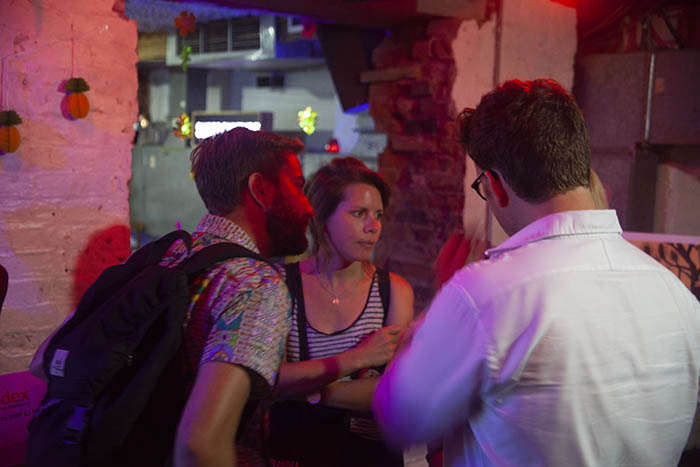
“The best travel writers do weave in the history and the politics of a place,” said Selva, while Fitch Little, talking about travel writing that might be paid for by travel companies or tourist boards as opposed to publications, said “there’s a way to write about a press trip that is fascinating and revealing.”
All panellists agreed on the value of speaking to locals in a destination, though they also acknowledged that doing so was not necessarily on the top of everyone’s holiday priority list, in particular families who might just want a nice break or might not have the budget for more adventurous travel – and that shouldn’t necessarily be condemned. “We all need escapism from time to time,” said Baker.
The panel also discussed whether travel journalists should write about problematic countries at all, raising questions about whether travelling to these places – and encouraging others to travel to them – benefits corrupt regimes.
“The best travel writers don’t just regurgitate the travel documents provided by the government,” Lanyado said.
“Sometimes you can get so obsessed by the pitfalls of a country and the leaders of a country that you forget about the people, and they can be totally different,” he added and asked whether boycotting a country was a form of censorship in its own right.
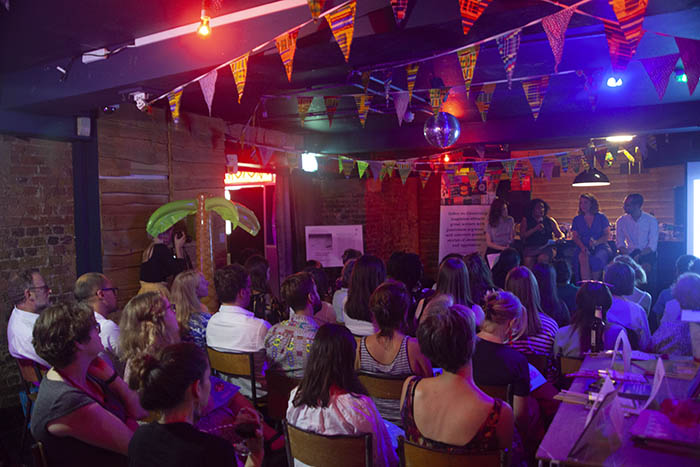
“If you don’t go, you don’t learn about the people,” said Baker.
Selva recalled a story of a travel journalist who went on a press trip to North Korea. While this journalist had first-hand experience of government propaganda, they also saw another side of the country when their bus driver did a detour into the countryside, heading off the beaten track. Had the travel journalist not gone, they would not have been able to report on this side.
The question of “ethical travel” was picked up by an audience member, Tina Urso from Malta, who spoke about Daphne Caruana Galizia, a Maltese journalist who was murdered on 16 October 2017 some 70 metres away from her home. Her death, which remains unsolved, exposed Malta’s dark side. There is now a memorial to Daphne opposite the central law courts in Valletta, the capital.
Urso said how this memorial is constantly dismantled, but that tourists, more so than locals, regularly rebuild it. She therefore saw the presence of tourists in Malta as playing a fundamental – and positive – role in highlighting these free speech abuses.
Finally, Fitch Little, who worked for local press in Lebanon and Cambodia, noted that there can sometimes be pressure coming from the other direction, namely pressure for writers to ham up the darker sides of destinations and that this too can conceal the real truth. She said how when writing about Cambodia, UK media often wanted a particular angle, usually one related to the Khmer Rouge.
Equally, when working for Time Out in Lebanon, her friends back home found it hard to believe that the country could have nice restaurants, for example, having seen the country in a more negative light. “Less sexy stories don’t get told,” she said.
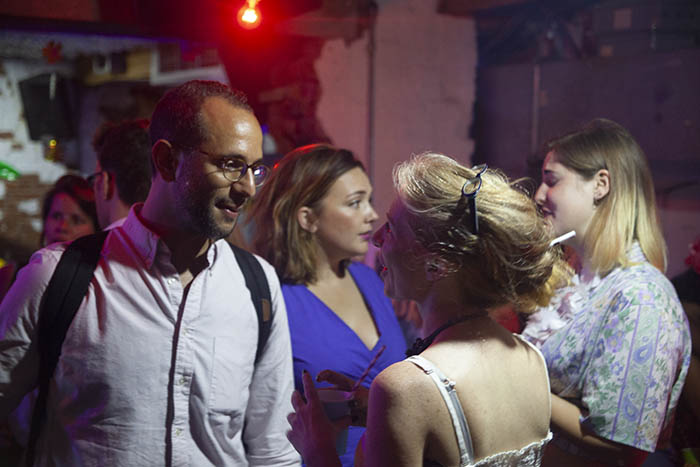
For more information on the summer issue of the magazine, click here. Included in the issue is an article from a Maltese journalist, Caroline Muscat, on corruption in the country, a look at journalists living under protection due to their reporting of the drug wars in Baja California Sur and an interview with Federica Angeli, a journalist who lives under 24-hour police protection following her exposé of the mafia in the pretty Italian seaside resort of Ostia.
[/vc_column_text][/vc_column][/vc_row][vc_row][vc_column width=”1/3″][vc_custom_heading text=”Trouble in Paradise”][vc_column_text]The summer 2018 issue of Index on Censorship magazine takes you on holiday, just a different kind of holiday. From Malta to the Maldives, we explore how freedom of expression is under attack in dream destinations around the world.
With: Martin Rowson, Jon Savage, Jonathan Tel [/vc_column_text][/vc_column][vc_column width=”1/3″][vc_single_image image=”100843″ img_size=”medium”][/vc_column][vc_column width=”1/3″][vc_custom_heading text=”Subscribe”][vc_column_text]In print, online. In your mailbox, on your iPad.
Subscription options from £18 or just £1.49 in the App Store for a digital issue.
Every subscriber helps support Index on Censorship’s projects around the world.
 SUBSCRIBE NOW[/vc_column_text][/vc_column][/vc_row]
SUBSCRIBE NOW[/vc_column_text][/vc_column][/vc_row]
05 Jul 18 | Azerbaijan, Azerbaijan Statements, Campaigns -- Featured, Statements
[vc_row][vc_column][vc_column_text]In a joint statement in June, 42 civil society organisations, including Index on Censorship, called on the Parliamentary Assembly of the Council of Europe to appoint a rapporteur to examine the issue of political prisoners in Azerbaijan.
One of the cases highlighted in the statement was that of investigative journalist Afgan Mukhtarli, whose case Index had raised with the Council of Europe’s Platform for the Protection of Journalism and Safety of Journalists after receiving a report through their Mapping Media Freedom platform. Mukhtarli disappeared from Georgia in highly questionable circumstances in 2017, reappearing in Azerbaijan where he was sentenced to six years in jail on what the OSCE media freedom representative has referred to as spurious charges and an attack on free media.
Joy Hyvarinen, head of advocacy at Index, said: “Index on Censorship welcomes the appointment of a rapporteur to prepare a report on political prisoners in Azerbaijan for the Parliamentary Assembly of the Council of Europe. We urge the rapporteur Thorhildur Sunna Ævarsdóttir to prepare a frank report on the situation, in particular the case of journalist Afgan Mukhtarli, who was jailed for six years on spurious charges”.[/vc_column_text][/vc_column][/vc_row][vc_row][vc_column][vc_basic_grid post_type=”post” max_items=”4″ element_width=”6″ grid_id=”vc_gid:1530793587839-a74e8496-f02b-4″ taxonomies=”7145″][/vc_column][/vc_row]
05 Jul 18 | Events
[vc_row][vc_column][vc_single_image image=”100897″ img_size=”full” alignment=”center”][vc_column_text]50 years on do we need a new Theatres Act? Are artists and cultural institutions entering a new era of self-censorship and if so what does the future look like? Join leading cultural and political figures in a panel discussion that explores the complexities of modern day censorship and its impact on arts and culture.
This event is in collaboration with the Index on Censorship.
There will also be the opportunity to put your questions to the panel on the night #JoinTheDebate
Julia Farrington
Index on Censorship – International freelance producer, campaigner and trainer, working at the intersection between arts and human rights. Specialises in artistic freedom of expression
Shereener Browne – Barrister at Garden Court Chambers with over 23 years experience. She started her legal career at the criminal bar and built a reputation for defending young offenders accused of serious gang-related crimes. In 2016 Shereener embarked up an acting career.
Agnieszka Kolek – Artist, Curator, Polish Woman of the Year 2013 in the UK for Co-organizing and Curating Passion for Freedom London Art Festival.
Anders Lustgarten – Political playwright “renowned for his hard-hitting, wide-ranging approach to political and social questions” (Time Out). Recent work includes The Secret Theatre at Shakespeare’s Globe (2017), an allegory for modern surveillance set in the reign of Elizabeth I.
Kenan Malik – Writer, lecturer and broadcaster. Columnist for the Observer and International New York Times. Latest book: The Quest for a Moral Compass (Atlantic).[/vc_column_text][vc_column_text]
When: Thursday 20 September, 7-8:30pm
Where: Sam Wanamaker Playhouse, 21 New Globe Walk, Bankside, London SE1 9DT (Directions)
Tickets: £15 (£12 Members / Students) via Shakespeare’s Globe
[/vc_column_text][/vc_column][/vc_row]
04 Jul 18 | Index in the Press
On 20 June, the Legal Affairs Committee of the European Parliament voted in favour of an extremely controversial copyright directive proposed by the European Commission. While promoted as protecting the work done by the creative industry, several provisions within it threaten to significantly limit how we share information on the internet globally in the future, with potentially severe results for freedom of expression online. Read in full.
04 Jul 18 | Event Reports, News and features
[vc_row][vc_column][vc_column_text]Additional reporting by Shreya Parjan, Nicole Ntim-Addae and Sandra Oseifri.
“The only effective and durable way to resist racism and discrimination is through speech and other non-censorial measures,” said Nadine Strossen at the launch of her new book, Hate: Why We Should Resist it With Free Speech, Not Censorship, at the London School of Economics on Monday 2 June.
Strossen, a professor of constitutional law at the New York Law School, was joined by Jodie Ginsberg, CEO of Index on Censorship, and Joanna Williams, author, academic and the associate editor of the online magazine Spiked. The panel was chaired by Peter Ramsey, professor of law at LSE.
“The bedrock principle of our [the US’s] legal system is viewpoint neutrality, that governments can’t restrict speech even if it is despised by the majority of the population,” Strossen said. According to the First Amendment, the US government cannot prevent or censor the speech of a group due to the nature of its content. The American Civil Liberties Union, where Strossen served as president from 1991 to 2008, has had a long history of defending the rights of groups that would otherwise not be able to voice their opinions due to censorship. For example, in 1978, in a landmark Supreme Court case, National Socialist Party v. Skokie, the ACLU successfully defended the right of a neo-Nazi group to march through Skokie, Illinois, where many Holocaust survivors lived.
Strossen, whose father was a Holocaust survivor, expressed her deep loathing for Nazism and commitment to resisting hate and racism, describing it as “a very serious and rising problem, not only in the US but all over the world”. At the same time, however, she does not believe that the way to resist such sentiments is through censorship and regulations aimed at banning hate speech. She explained that hate speech laws enforced against Nazis would backfire: in the Weimar Republic, where hate speech laws were rigorously enforced, “the Nazis loved it – it became a propaganda platform for them”. The same phenomenon is observable in the US, where alt-right provocateurs such as Milo Yiannopoulos “love when there are attempts to suppress them or when there are disruptive protests against them”. Censorship would merely lead to more attention for hate groups.
Strossen believes, as Judge Wendell Holmes did, that a more effective way to resist hateful and racist speech is through more speech and counter-speech. “I celebrate effective, humane speech, not only because it is consistent with individual liberty,” she said, “but because it is the best way to lead people away from hate”. A more effective way to combat the hateful sentiment of a provocative speaker on campus is to “have your own separate event in a different part of campus … in an affirmative celebration of diversity”.
After the ACLU successfully defended the right of the neo-Nazis to march in Skokie, there was an outpouring of support for Holocaust survivors. The survivors realised that they could no longer remain silent, but must rather combat hate with education. The Illinois Holocaust Museum and Education Center, opened in 2009, is one demonstration of the positive results that came out of dialogues and discussions after Skokie. Strossen noted that “all of that might have been impossible without Skokie”.
Ginsberg raised three questions to keep in mind when considering whether hate speech regulations should be put in place: “Is freedom of expression a fundamental right? Would you agree that there are certain speakers that should not be allowed to speak on university campuses? Would you accept any limitations on your own speech?” She suggested that “much of what we say and do depend on context”, and that “if we buy into the narrative that it’s all getting worse, people get afraid and allow restrictions on their own freedom of speech”.
Williams, the author of the 2017 book Women Versus Feminism: Why We All Need Liberating from the Gender Wars, cited the case of a controversial Youtuber who was prevented from speaking at the University of Sussex. According to Williams, this was a case of censorship based on viewpoint restriction. Williams disagrees with Strossen, however, on the point that there needs to be a separate student event to reaffirm diversity: “There is no point in hosting a separate event but instead the students should be in the same room, challenging what the speaker says.”
Williams noted that political activism in the modern age is driven by identity politics – that is, it is based on finding things offensive and calling for things to be banned. It is, therefore, according to her, “fundamentally opposed to free speech.” Thus, Williams called for a reconsideration of the category of “hate speech” as it currently stands. “Defining hate speech is not something I am able to do,” she said, “the problem with hate speech laws lies in the law itself, there is no such thing as hate speech.” As the case of the Youtuber Count Dankula illustrates, one man’s hate speech could be another man’s joke. We cannot decide what is objectively right and wrong through education, either: “Educating makes it seems like we as a privileged elite have defined objectively correct speech.”
On the question of whether there are more meaningful ways to combat hate speech, Ginsberg points out that one of the positive effects of social media is that “it helps people find supportive communities”. “It is important for people to realise they’re not alone,” she added. At the same time, however, she raised concerns around the potential ability of big technology companies to censor content: “The duty of care is interesting but problematic: unelected companies shouldn’t have the authority to remove content.” This is an important consideration right now in the UK, where the proposed counter-terrorism bill could potentially put further limitations on freedom of expression, meaning technology companies could “blanket-remove totally legal speech because there is no oversight whatsoever”.[/vc_column_text][/vc_column][/vc_row][vc_row][vc_column][vc_basic_grid post_type=”post” max_items=”4″ element_width=”6″ grid_id=”vc_gid:1531238430673-ea06dafb-36eb-10″ taxonomies=”737″][/vc_column][/vc_row]
03 Jul 18 | Digital Freedom, News and features
[vc_row][vc_column][vc_single_image image=”101103″ img_size=”full” add_caption=”yes”][vc_column_text]Cultural stereotyping, extremism, a patriarchal society, a deficit of safe and secure educational environments, verbal and sexual harassment. These are the terms that Fereshteh Forough, founder of Afghanistan’s first ever coding school for girls uses to describe what women face in her country every day.
This repression continued after the fall of the Taliban in 2011, the Code to Inspire CEO told Index on Censorship, and still “prevents women from participating in many social activities outside of their hometown”.
Forough is working to open up online spaces for women and hopes that in doing so these digital freedoms will break down social and economic barriers in Afghanistan. Code to Inspire’s first school opened in Afghanistan in 2015 and teaches girls how to programme. By empowering young women Forough hopes to carve a way through the digital space, which mirrors the male-dominated spaces of their lives, so they can participate in the economic market in Afghanistan and gain independence. “Knowledge is power and technology is the tool for empowerment,” she said.
Harnessing technology is a way, Forough believes, of liberating women in all aspects of their lives. It is a way of using progress to combat regression. “Looking at the technology and how it enables people to cross borders without geographical boundaries and share their stories is such an empowering tool,” she explains.
“For an Afghan woman who can not commute due to family restrictions or safety reasons to other cities or outside, it can help her to explore the world virtually, get connected to the people outside of Afghanistan and feel more confident.”
Connecting
Internet use in Pakistan and Afghanistan is far from straightforward and being a woman makes it even harder.
Internet access in Afghanistan has much improved since the fall of the Taliban. Yet despite the current government’s recognition of the tool as important for the country’s development, problems remain. The CIA factbook reported in 2016 that only an estimated 10.6% of the country’s population had access to the internet. The National Unity Government is working to end gender inequality and there are more women holding positions of power than at any other time in history. 27.7% of seats in parliament are held by women. But according to Global Rights Study, 87% of women experience physical, sexual or psychological violence in their lives. Stigma still surrounds female education despite rising numbers in school attendance.
Freedom House concluded in their 2017 Freedom of the Net report that Pakistan’s internet is “not free”. Starting in June 2016, Pakistan’s mobile internet service was shut off for more than a year in Federally Administered Tribal Areas. The internet has been shut down several other times at politically divisive moments. As the country comes up to an election this year, Freedom House predicts internet shutdowns and for political speech to be restricted online.
The country’s first comprehensive cybercrime act was passed in 2016 by the National Assembly and Senate, enabling censorship and surveillance. Alongside infrastructure limitations, taxes on the internet are high and prevent the majority of the population from connecting. Many rural areas remain offline due to ongoing conflict or underdevelopment.
“Women are being excluded from the digital revolution”
While progress may be slow and the internet unstable, going online presents fresh possibilities and challenges for women in these neighbouring countries. As new technologies clash with historically patriarchal cultures, being connected means being seen. Being plugged in provides greater scope for education and potential participation in an ever-expanding jobs market. Online spaces, ideally, enable democratic discussion and freedom of expression. But in societies where independent women can be regarded as shameful, prejudice inevitably follows them into online spaces.
Mats Granryd, director general of the UN’s Working Group on the Gender Digital Divide said in their 2017 report: “Mobile is the dominant platform for internet access in many parts of the world. The issue is that while mobile connectivity is spreading quickly, it is not spreading equally.” Oliver Rowntree reported from GSMA’s Connected Women’s Study 2018: “Women are being excluded from the digital revolution. Only 10% of women in Pakistan use mobile internet compared to 26% of men.”
Access to technology and autonomy online are difficult, however. Access is often monitored by male family members or connections. Some women are fatally endangered through online activity.
In 2016 Qandeel Baloch died after being strangled by her brother for her social media presence. In his confession, he said: “Girls are born only to stay at home and to bring honour to the family by following family traditions.” Online harassment is rife and further discourages women from accessing information communication technologies, especially with social support in such situations unlikely.
“The digital divide between men and women in Pakistan is among the highest in the world as a result of religious, social, and cultural restrictions on women owning devices,” Freedom House’s report outlines. Militant Islamic attacks have also been carried out on internet cafes for encouraging moral corruption.
Professor Deborah Wheeler has lectured throughout the Middle East and Europe about her research into the internet’s impacts on women. She currently works in the United States Naval Academy’s Political Science Department. Wheeler is passionate about the potential for technology to empower women everywhere.
She tells Index on Censorship: “Given social constraints on women’s movement, participation in public life, dress, expectations and voice in the Muslim world, digital communication gives women tools with which to create change on issues which directly affect their lives.”
“While censorship and punishment for violating media laws by directly opposing the government online do occur, what I find more interesting and more promising as a force for change in women’s lives, are the kinds of widespread experimentation with voice and agency taking place in everyday life.”[/vc_column_text][/vc_column][/vc_row][vc_row][vc_column][vc_raw_html]JTNDZGl2JTIwc3R5bGUlM0QlMjJtYXgtd2lkdGglM0E4NTRweCUyMiUzRSUzQ2RpdiUyMHN0eWxlJTNEJTIycG9zaXRpb24lM0FyZWxhdGl2ZSUzQmhlaWdodCUzQTAlM0JwYWRkaW5nLWJvdHRvbSUzQTU2LjI1JTI1JTIyJTNFJTNDaWZyYW1lJTIwc3JjJTNEJTIyaHR0cHMlM0ElMkYlMkZlbWJlZC50ZWQuY29tJTJGdGFsa3MlMkZuaWdoYXRfZGFkX2hvd19wYWtpc3Rhbmlfd29tZW5fYXJlX3Rha2luZ190aGVfaW50ZXJuZXRfYmFjayUyMiUyMHdpZHRoJTNEJTIyODU0JTIyJTIwaGVpZ2h0JTNEJTIyNDgwJTIyJTIwc3R5bGUlM0QlMjJwb3NpdGlvbiUzQWFic29sdXRlJTNCbGVmdCUzQTAlM0J0b3AlM0EwJTNCd2lkdGglM0ExMDAlMjUlM0JoZWlnaHQlM0ExMDAlMjUlMjIlMjBmcmFtZWJvcmRlciUzRCUyMjAlMjIlMjBzY3JvbGxpbmclM0QlMjJubyUyMiUyMGFsbG93ZnVsbHNjcmVlbiUzRSUzQyUyRmlmcmFtZSUzRSUzQyUyRmRpdiUzRSUzQyUyRmRpdiUzRQ==[/vc_raw_html][vc_column_text]Time for change
Like Forough, Nighat Dad, who runs Pakistan’s Digital Rights Foundation, is trying to enable just that. A digital rights lawyer and activist in Pakistan, she is fighting against women’s exclusion from online spaces and working to ensure safety online. She told TED: “It’s how patriarchal norms treat women in offline spaces, and the same mindset is true in online spaces.”
Dad explains that her family forbade her from having a phone as a young woman. Her husband, from whom she is divorced, allowed her to have a phone but it was so strictly monitored she says it felt more like a surveillance device. She founded the Digital Rights Foundation, which like Code to Inspire was shortlisted for a 2018 Index on Censorship Freedom of Expression Awards Fellowship, in 2012 to defend women’s rights online. They recently established a helpline for women experiencing harassment online.
Women, who make up only 20-25% of internet users in the country, are regularly subjected to revenge porn, harassment, blackmail, privacy violations and more. As a result, they retreat from online spaces. Dad wants to prevent this silencing of women’s voices.
The DRF said: “Digital Rights Foundation envisions a place where all people, and especially women, are able to exercise their right of expression without being threatened.”
Hope
Thanks to the courage and persistence of women like Forough and Dad, things are changing in Afghanistan and Pakistan. Forough is not letting a lack of resources hold her back. “Sometimes you don’t have the available resources to succeed,” she said. “As a refugee born, I learned to be scrappy and resourceful. Change is possible, no matter who or where you are!”
Over email, she quotes Rumi. “‘Where there is ruin, there is hope for a treasure.’ From the ruins of a shattered nation and shattered lives of refugees can come treasure, if we know where to find it. We hope to empower this generation of young women in Afghanistan with technology so that the next generation will be peacebuilders and not war makers.”
Women like Nighat and Fereshteh are forging a new future for women, both online and off. Nighat tells Index on Censorship she hopes for “A future where women don’t have to fight for the rights they were born with, a future that is without discrimination and is safe, inclusive and free for everyone.”[/vc_column_text][/vc_column][/vc_row][vc_row][vc_column][three_column_post title=”Digital Freedom” full_width_heading=”true” category_id=”4883″][/vc_column][/vc_row]








